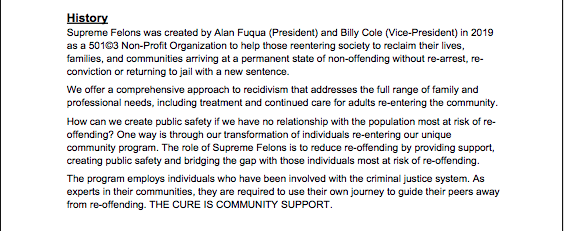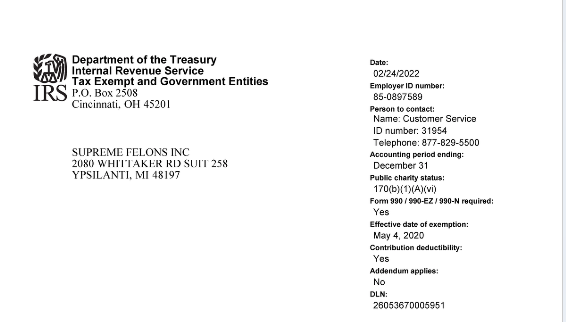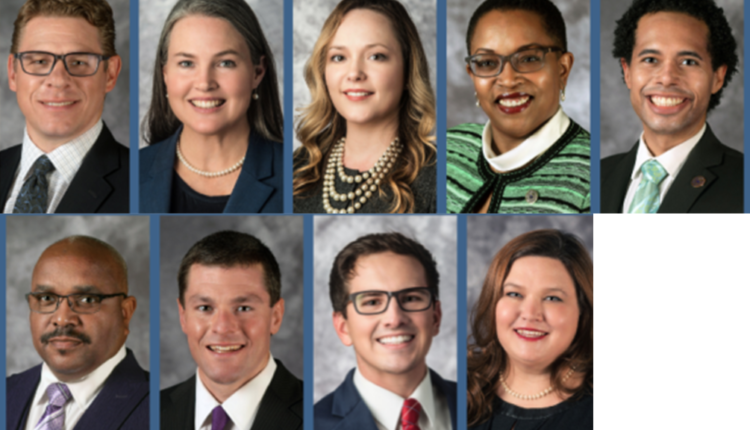County Commissioners Handed Registered Sex Offender, and County Employee on Parole $1.2M ARPA Grant
10/19/22: Updated with a comment from Brian Foley of Supreme Felons, Inc.
Washtenaw County earmarked a total of $8 million in federal ARPA funds to distribute grants to community groups focused on, among other issues, community violence intervention. In July 2022, County Administrator Greg Dill recommended County Commissioners vote to give Supreme Felons $1.2 million of the initial $2 million of the $8 million total made available. At the meeting, Commissioners were told Supreme Felons was founded, and is controlled by, its President Billy Cole. Cole, a felon on parole, is a part-time outreach worker in the Sheriff’s Dept.
by P.D. Lesko
State incorporation documents show that Supreme Felons, Inc. was registered as a Michigan non-profit corporation in April 2020 by Alan Fuqua and Billy Cole. In July 2022, the members of the Washtenaw County Board of Commissioners voted unanimously to award Supreme Felons, Inc. a $1.2 million, three-year grant from ARPA funds. Among the work the group purported to have done, according to its proposal submitted in support of the $1.2 million grant, was mentoring students in the Ypsilanti Public Schools and the WISD. The proposal stated that Supreme Felons would “push-into” more public schools, including the YPS and WISD, and “assist school leadership.” The Supreme Felons, Inc. proposal also claimed the group’s work with children, including in public schools, would be “expanded” with the $1.2 million grant.
The group’s claims related to partnerships with the WISD and public schools, including Ypsilanti public schools, were fabricated.
Both YPS and WISD superintendents said, when asked to comment, that their schools had no members of Supreme Felons, Inc. in their classrooms. Both superintendents said Supreme Felons, Inc. had never mentored students in those schools, and that neither YPS nor the WISD had been approached by Supreme Felons, Inc. to establish any kind of partnership ever.
In response to questions about inconsistencies in the group’s proposal and about the Supreme Felons, Inc. “creation story,” County Administrator Greg Dill said, “As related to your questions about Supreme Felons, Inc. (SF), Supreme Felons started as a loosely affiliated group late 2019, early 2020, specifically responding to needs of returning citizens utilizing a peer support model. Their first filing with the Michigan Secretary of State is dated May 2020 and lists both Billy Cole and Alan Fuqua as incorporators.”
Alan Fuqua is a registered sex offender who, in 2003, was convicted in Oakland County of 2nd degree criminal sexual conduct with a child under the age of 13. Public records show he was given a 15 to 30 year sentence and served 17 years; Billy Cole is presently on parole until August 2023. In the 70s, Cole was given a life sentence for murder, and 60 years for armed robbery by a Washtenaw County judge. Supreme Felons, Inc.’s Billy Cole is presently on parole and employed by the Washtenaw County Sheriff as an outreach worker.
The Ann Arbor Independent submitted a Freedom of Information Act request to the Ypsilanti Public Schools to determine if the district had ever permitted anyone associated with Supreme Felons into YPS schools as a volunteer. Michigan law requires school districts to alert the Michigan Dept. of Education if the principal of a school, in conjunction with the district’s school board members, vote to permit a felon into a public school building.
Non-profit leaders and others have raised questions about why the members of the County Board of Commissioners believed Supreme Felons could legally do the work outlined in its proposal and funded by the grant. In particular, the non-profit leaders point to the claims Supreme Felons, Inc. made in its proposal about having mentored within public schools, and having felons on parole mentoring felons newly-released from prison.

Sue Shink (left), Chair of the Washtenaw County Board of Commissioners, is a lawyer and a Democrat running for the Michigan Senate. The A2Indy contacted Shink, but she refused to answer any questions about the Supreme Felons proposal, and her vote to fund a non-profit registered to a sex offender and county employee on parole.
Shink’s opponent, Tim Golding said, “I believe we need elected officials who will properly use taxpayer dollars to keep our community safe and we need oversight and accountability at all levels of government.”
In March 2022, the Washtenaw County Board of Commissioners passed a resolution in which the Community Priority Fund (CPF) was created. According to the resolution, “the CPF is a strategic initiative funded by Washtenaw County’s federal American Rescue Plan Act (ARPA) allocation.” Of the $11,299,007 allocated to the Washtenaw County Rescue Plan, $8,000,000 was allocated to the CPF, money that would be distributed as grants. Goals include reducing community violence, hunger, improving mental health outcomes, reducing juvenile violence and crime, and eliminating educational disparities in Washtenaw County.
The A2Indy shared the Supreme Felons, Inc. proposal with other CPF grant applicants. The responses were unequivocal.
“Felons mentoring in Ypsi public schools? In the WISD? In Juvie (juvenile detention)? Nope. With what qualification[s]? With what kind of supervision? Felons mentoring felons on parole? Felons on parole can’t be with other felons,” said one CPF fund applicant whose application for funding was turned down. “Who were the county staff who evaluated that proposal? Nothing but cronyism from Greg Dill and Jerry Clayton.”
“The County Commissioners are super-sized fools desperate to look like they’re doing something for the folks in Ypsi and Ypsi Township,” said another Community Priority Fund grant applicant who asked not to be identified because, they said, their application had not yet been evaluated for funding. The grant applicant, a long-time Ypsilanti resident and activist added, “The Supreme Felons proposal is a fairytale.”
In the category of community violence intervention (CVI), the County received 16 grant applications and funded three.
In July 2022, the Washtenaw County Administrator Greg Dill recommended to the Board of Commissioners that they vote to give a $1.2 million ARPA fund grant to non-profit Supreme Felons, Inc. The grant raised eyebrows among non-profit leaders in Ypsilanti. The grant also raised questions about the credibility and veracity of the RPF submitted by Supreme Felons, Inc. in support of the $1.2 million grant.
Former Ypsilanti Township Trustee Monica Ross-Williams is concerned that the $1.2 million grant was awarded in order “throw money” at the 48197/48198 zip code within County Commission District 9, and to throw money at Black people in Ypsilanti and Ypsilanti Township before the August 2022 primary elections.
“They [the County Commissioners] wanted to be able to say, ‘Look, we’re doing something about community violence.'”
Ross-Williams suggested the grant was the result of “playing politics” on the part of County Commissioners.

- According to the group’s website, “Supreme Felons was created by Billy Cole, Brian Foley and Jeannette Haddenen in 2019 as a 501©3 Non-Profit Organization….”
- According to a version of the proposal provided to the Ypsilanti DDA in August 2022—one month after the Commissioners voted to give Supreme Felons the grant—”Supreme Felons was created by Alan Fuqua (President) and Billy Cole (Vice President) in 2019 as a 501©3 Non-Profit Organization….”
- According to the proposal submitted by the group for the grant, “Supreme Felons was created by Billy Cole in 2019 as a 501©3 Non-Profit Organization.” Alan Fuqua’s involvement was hidden.
Alan Fuqua was removed as the registered agent of Supreme Felons, Inc. one day before the ARPA funding grant applications were due in April 2022. Nonetheless, a photo of Fuqua appears in the 2022 proposal submitted to the County for the ARPA grant funding. County Administrator Greg Dill, when asked about Fuqua’s involvement, replied by email that, “As far as we are aware, Alan Fuqua is no longer connected to Supreme Felons, Inc. The registered agent for the organization is listed as Billy Cole.”
Mr. Dill was asked to provide any proof that Alan Fuqua had been removed as a director of the non-profit and was, indeed, no longer connected to Supreme Felons. He has not done so.

In August 18, 2022 notes from a meeting of the Ypsilanti DDA, the Supreme Felons’s $1.2 million grant application was on the group’s consent agenda. In that version of the Supreme Felon’s, Inc. proposal, provided by Supreme Felons’s “creator” (group’s website) Brian Foley, who is also an Ypsi DDA Board member, Alan Fuqua founded Supreme Felons in 2019 as a 501(c)3 non-profit organization.
State incorporation documents show that Supreme Felons, Inc. was registered as a Michigan non-profit corporation in April 2020 by Alan Fuqua and Billy Cole. Fuqua was in prison until July 2020. Public records show Cole was released in August 2019. Both Cole and Fuqua are currently listed as the non-profit’s only directors.
Critics have also questioned the fact that a Wayne County non-profit and a Wayne County resident (Cole) landed a $1.2 million ARPA grant from Washtenaw County.
Monica Ross-Williams said in an email: “At this time, there are many questions about the process lacking answers. According to the Washtenaw County Governmental website for the Community Priority Funding (CPF) Grant, it states, ‘The goals are to increase equitable, community-informed allocations of ARPA funding and to support full, ecosystem development for organizations who have not been previously eligible to contract with Washtenaw County.’ Nevertheless, elected officials have a fiduciary duty to taxpayers to perform due diligence for all taxpayer provided funding. The duty equally applies to County Administrator and/or Executive Offices as well in their recommendations. Both entities must be accountable to the public for all steps in the process to uphold their fiduciary duty in an ethical manner as it relates to the ARPA Grants.”
The first round of grants given out by the Board of Commissioners was aimed at community violence intervention. Washtenaw County non-profits competed for $2 million in grant money. The applicants’ proposal went through a four-step round of evaluation:
- County administrative staff reviewed each application for minimal eligibility. They looked at the viability of the project or program, to ensure that each proposal met the minimum requirements set by ARPA
- Community Review Board – this appointed board reviewed all eligible applications. They made recommendations to the County Administrator for which projects/programs should or should not be funded, and why.
- County Administrator reviewed the Community Review Board’s recommendations. He then made recommendations to the Board of Commissioners about which projects/programs should be funded.
- Board of Commissioners votes.
Alize Asberry Paine is the Director of the County’s Racial Equity Office. She told County Commissioners at the July 6, 2022 meeting, where the ARPA grants were awarded, that “All proposals… are going to receive the support to insure compliance with ARPA reporting requirements.”
Asberry Paine went on to say that, “We received 136 applications. The community review board reviewed, scored and discussed proposals and provided recommendations to the Administrator.” Asberry Paine added that the names of the community review board members would remain secret until the end of the granting process. The Ann Arbor Independent submitted a FOIA to obtain the names of the citizens appointed to the review board, and all of the group’s meeting minutes.
James Van Bramer works at John Jay College. He says, “Despite the increasing use of Community Violence Intervention (CVI) programs in jurisdictions around the country, evidence of the strategy’s effectiveness is promising but as yet inconclusive, according to an analysis by the Research and Evaluation Center at John Jay College.”
That analysis concludes, “The violence prevention field, including community violence intervention (CVI), must confront these challenges, and advocates need more than political rhetoric and ideology.” In addition, the analysis said, “Sustainable progress requires evidence. Researchers must work closely with policymakers and community groups to answer these important questions using rigorous evaluations of CVI-R processes and outcomes.”
“This Supreme Felons grant smells so bad,” said Monica Ross-Williams. “The entire process must be immediately revisited to ensure it was done in an ethical manner. This includes detailing who is eligible to apply for the Community Funding Grants and all criteria required in the process, for full public disclosure.”
The newspaper left messages for Billy Cole, and contacted Supreme Felons, Inc. through a contact form and email address on its website, requesting a comment. Cole did not respond, and multiple messages went unanswered.
On Oct. 19, the newspaper contacted Brian Foley. Foley, who in a 2022 article describes himself as a “community activist with a burning passion” and a habitual criminal, served time in federal prison for bank robbery. On the Supreme Felons, Inc. website, Foley is identified as the group’s “creator.” He has also publicly identified himself as the non-profit’s “Managing Director.” Foley refused to answer questions about the non-profit and fabrications in the proposal submitted for the grant because, he said, “the story was already written.” Foley went on to threaten that the newspaper would be “hearing from our lawyer.” When asked the name of the lawyer, Foley refused to identify the name of the group’s legal representative.
Read the Supreme Felons, Inc. proposal below:



Comments are closed, but trackbacks and pingbacks are open.